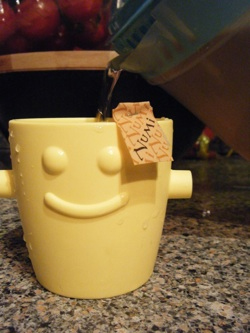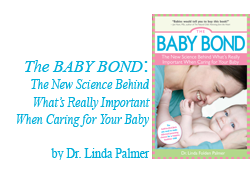
Herbal teas are probably something you’ve never thought about giving your young children. But they’re a good alternative beverage for them.
Everything you ever wanted to know about tots & teas
- By Angele Sionna, Early Childhood Parenting on Examiner Examiner.com
They can be served slightly warm or iced without adding any sweetners. If you do add sweeteners, just a little honey is all they need. (*Make sure to never give honey to children under one year old.*) I talked with a few experts recently about confidently giving herbal teas to young children.
Linda F. Palmer, natural infant health and nutrition consultant and author of Baby Matters, (also released as “The Baby Bond”), says:
Herbal teas are a perfect drink choice for children. Juices are high in sugar and missing the healthful fibers of whole fruits. Drinks loaded with corn syrup or artificial sweeteners are certainly bad news and should never be started. Water is wonderful but can sometimes lose its excitement.
I find it funny how many parents have been afraid to allow their children to share some chamomile tea that I’ve brought to an event, while many of those same children can be seen with a “juice” pouch or even a “lemon/lime” soda; both packed with corn syrup.
While tea doesn’t need to be sweetened, it takes only a half teaspoon of honey (not for infants under 1 year), sugar, or agave nectar to pleasantly sweeten 8 ounces of tea. Soda or grape juice deliver 13 times that amount of sugar, and we now know that corn syrup has detriments of its own beyond the sugar content. At the same time, various teas provide wonderful antioxidant, anti-cancer, and antimicrobial benefits. There’s no reason to even start sweeter drinks when tea can be so satisfying, healthy, and prevent the development of sweeter desires.
Nutrition Strategist Jill Nussinow, recommends the following herbal teas for older babies and toddlers:
- lemon balm
- lemongrass
- ginger
- chamomile
- mint
- red teas with rosehips and hibiscus
- honeybush
- rooibos
- tulsi
Nussinow reminds parents that while chamomile is generally a good choice of toddler tea, “children who have ragweed allergies can have problem with this so you want to monitor them.”
Palmer adds, “Echinacea is great but is not for every day usage as it’s a mild oxidant. Use it for short boosts to the immune system. Comfrey tea can cause liver damage and should be avoided. St. John’s wort should not be used unless under recommendation of an experienced health practitioner. Senna tea is used at times for constipation in children and again, should be done so only with good guidance.
“Chinese brick tea contains high amounts of fluoride; incredibly high in fact. Avoid this tea with children,” says Palmer. “Teas in the black tea family also contain polyphenols. While these provide some great antioxidant benefits, they can reduce iron absorption. This can be a concern for very young children when used regularly… Black tea also contains tannins. These too are healthful antioxidants but they may interfere with the digestive process a little in the very young.”
So, when can you start teas in babies?
Palmer says:
I occasionally suggest an herbal tea for an infant under 6 months of age, for medicinal purposes. Under four months of age, there are several concerns and generally teas are not recommended. There is very little iron in tea and it thus should not break the special immune bubble that exclusive breastmilk provides though generally if an exclusively breastfeeding mother is looking for an herbal benefit for her baby, she can consume the tea herself and pass it on in her milk. After a child is consuming more than just tastes of solid foods, herbal teas can be gently introduced whenever desired.
Dale Bellisfield, Clinical Herbalist and Holistic Health Consultant also stresses you should have a specific purpose in giving teas to children under six months old:
The herbs are interventions. Many are extremely safe, but not recommended, especially in infants under 6 months, unless you are treating a condition.
The diet for infants is breast milk and water. Herb teas are brought in for colic or diarrhea (along with electrolyte replacement), or topically for skin conditions. Gentle herbs can be given to infants directly as teas. Or, they can be taken in via breast milk after drunk by the mom. In 30 minutes to 5 hours after the mom’s drinking, they will be in the breast milk and will go directly into the baby.
For children, to reduce the sugar content of juices, to calm down, to help sleep, to aid digestive disturbances, to strengthen the immune, to assist in cold of flu or fever, and provide quality beverages, herb teas are great.
One brand of herbal tea that my daughters like drinking (plain with no sweeteners) are Numi Teas. I like them because they’re organic as well as yummy.
Here are some of the teas they make and recommend for children:
- Simply Mint- Our Moroccan mint has a bright vibrant flavor that tastes like a fresh picked leaf. A refreshing and soothing all-day or after-dinner delight.
- Rooibos– Red Mellow Bush- Rooibos is a South African herb rich in anti-oxidants and soothing to the nerves. Its deep, earthy taste makes it a perfect caffeine-free alternative to black tea.
- Honeybush– Bushman’s Brew- This wild honey-scented flowering bush creates an enticingly rich brew with sweet honey overtones. Rich in phytoestrogens, this new African herbal is both delicious and healthy.
- Ruby Chai– Spiced Rooibos- Earthy, vanilla Rooibos and a sultry blend of cloves, nutmeg, cinnamon, ginger, and cardamom come together from around the world in Numi’s caffeine-free chai.
- Chamomile Lemon– Sweet Meadows – A sweet and calming infusion of Egyptian chamomile flowers and bright, tangy lemon myrtle, an indigenous herb from the rainforests of Australia. (This one is my girls’ favorite so far!)
- Sweet African Red- Green Rooibos– From the same plant as Rooibos, yet un-oxidized, Green Rooibos surpasses even the anti-oxidant level of green tea. Its light, smooth woody taste is sweetly accented by healthy Honeybush.
- Dry Desert Lime-This rare and exotic Middle Eastern desert lime is sun-dried. It has a pleasingly tart taste and provides a hearty dose of Vitamin C.
- Decaf Black Vanilla which is really delicious [black tea] with some milk for kids. (not herbal)
- Decaf Ginger Sun which is a green tea with lemon and ginger. (not herbal)
Palmer also shared with me a fantastic time saving tip for moms who want to start serving teas for their little ones. “I just grab a full, reusable water bottle, stick in a teabag, maybe a squirt of sweetener, and I’m on my way out for the day. It teas-up soon enough. You can start with a bit of hot tap water and a 10 second swirl to speed up the process,” she says.
Great idea!
———————————————————-


This is awesome! Exactly the info I was looking for to begin serving my toddler nutritious tea instead of just plain water. Thankyou so much!
European Apothecary Teas sells Apotheke herbal teas that are prepared, blended, and portioned specifically for children and toddlers starting from 1 month of age. All teas are certified organic. Produced in Europe, these teas meet the strictest safety standards and are pediatrician approved and endorsed.
Hi there, my 3.5 year old has taken an interest in my honey lemon tea when I drink it. I wondered if it is considered safe for him to try? Or are there any ingredients commonly in honey lemon tea that I should watch for and avoid? Also wondering about peppermint tea for if he has an upset tummy. Thank you.
Those are perfectly delightful teas for your child over 1 year.
There is caution to be taken in giving honey to a child under 12 months and most people don’t do it.
Found this quickly w a search for honeybush. Very pleased and appreciative to have found this great resource! I enjoy all kinds of teas and my little boys have picked up the love; thanks!
My 3 year old grandson has been drinking matcha green/jasmine tea for a couple of years and loves it. I was wondering if it’s okay for him to enjoy. I tried green tea/ hibiscus for the first time today and loved it. I was wondering if you thought it would be safe for him as well.
They are healthy; full of antioxidants. Both green and jasmine have caffeine. Many parents prefer to keep caffeine levels down in their children, so be aware that it’s there, but I’ve never seen a study saying that it’s harmful to kids, or adults. If a child becomes “too” energetic, or has challenges falling asleep, I’m sure parents would modify things accordingly. Kids get caffeine from chocolate all the time, and parents don’t seem to have concern over that. Again, I’ve never seen any health/medical reason to. Caffeinated sodas and coffee are higher doses. There IS caffeine-free green tea (which my son and I drink all the time). I don’t know about matcha. The decaffeinating process, as far as I know, is non-toxic, for organic decaf. I haven’t investigated the non-organic.
Chinese brick tea is a strong green tea that is often very high in fluoride. I avoid that.
Happy sipping!
I was enjoying my lemon ginger tea with honey and my almost 11 month old was really interested in and i gave him a couple sips, which he really seemed to enjoyed. Im wondering if thats okay? Giving in considerationg the honey?
Personally, I’d give it to my own child, but I can’t make a recommendation to someone else against AAP advice.
I like how you mentioned that a kids don’t need actually need things like juice or soda because they’ll only make them addicted to sweet things. I like your idea of giving them herbal tea with a little bit of honey because it is healthier and can satisfy their sweet tooth. I think I’m going to try this with my kids while they’re young.
[…] Visit your local loose leaf tea shop and ask about kid friendly herbal teas. […]